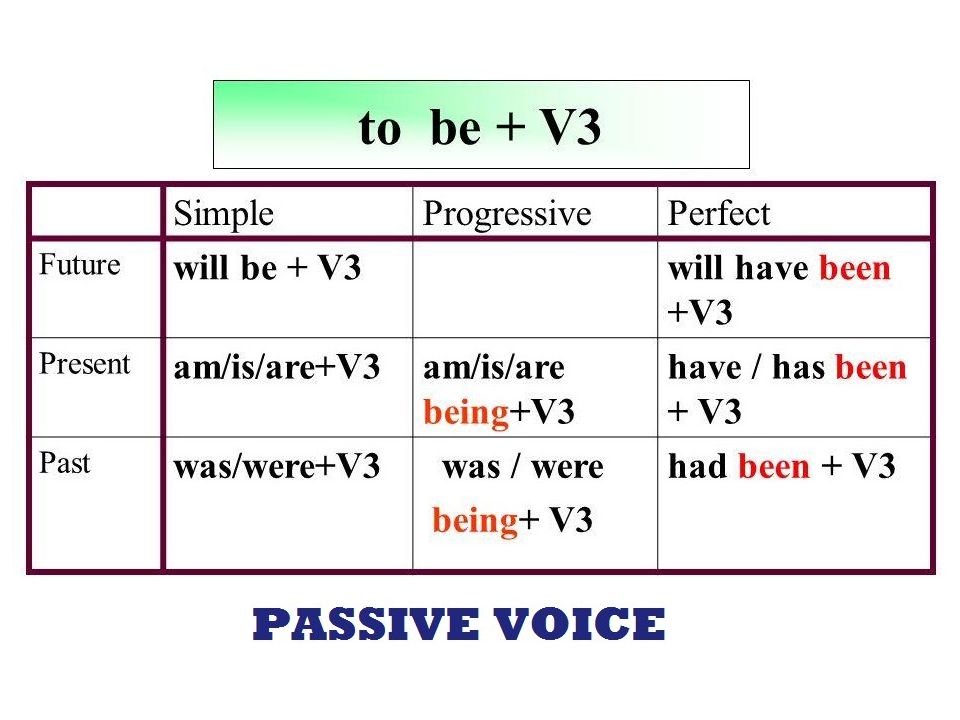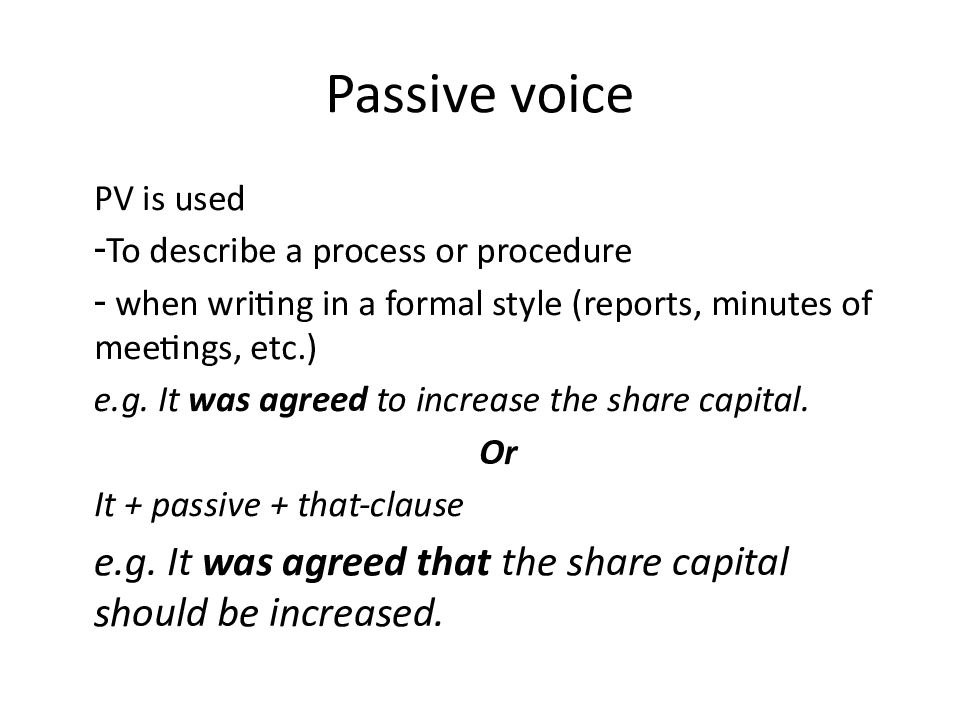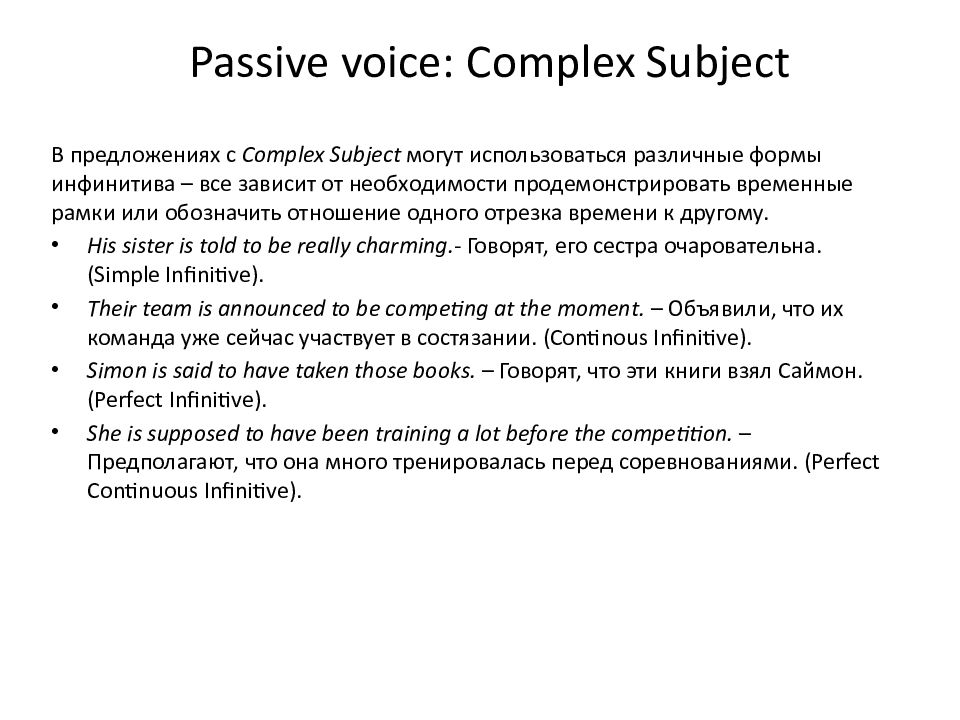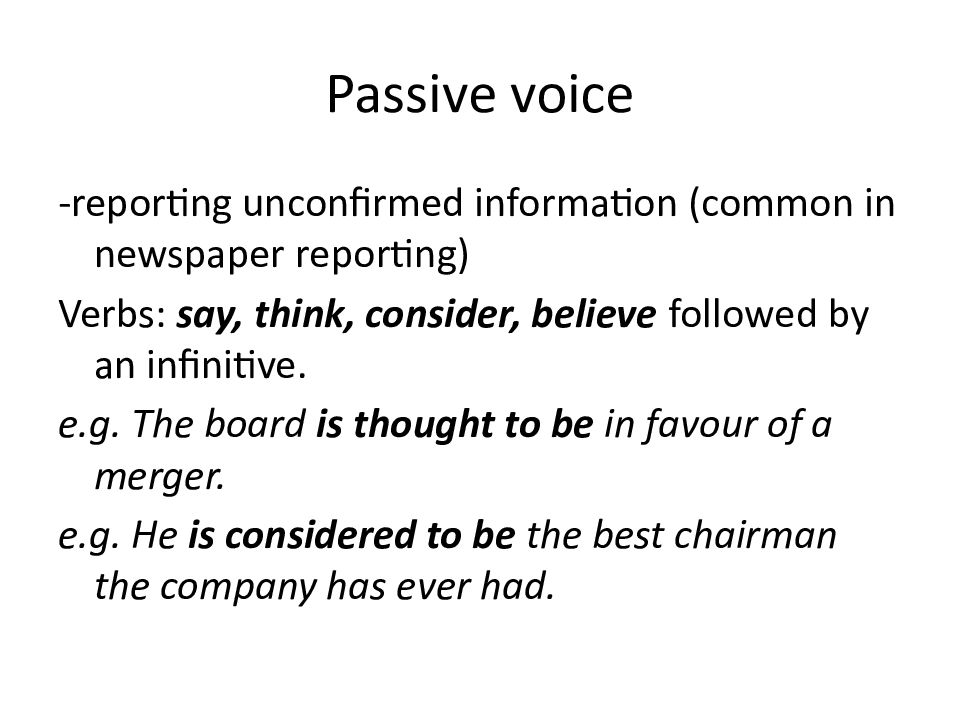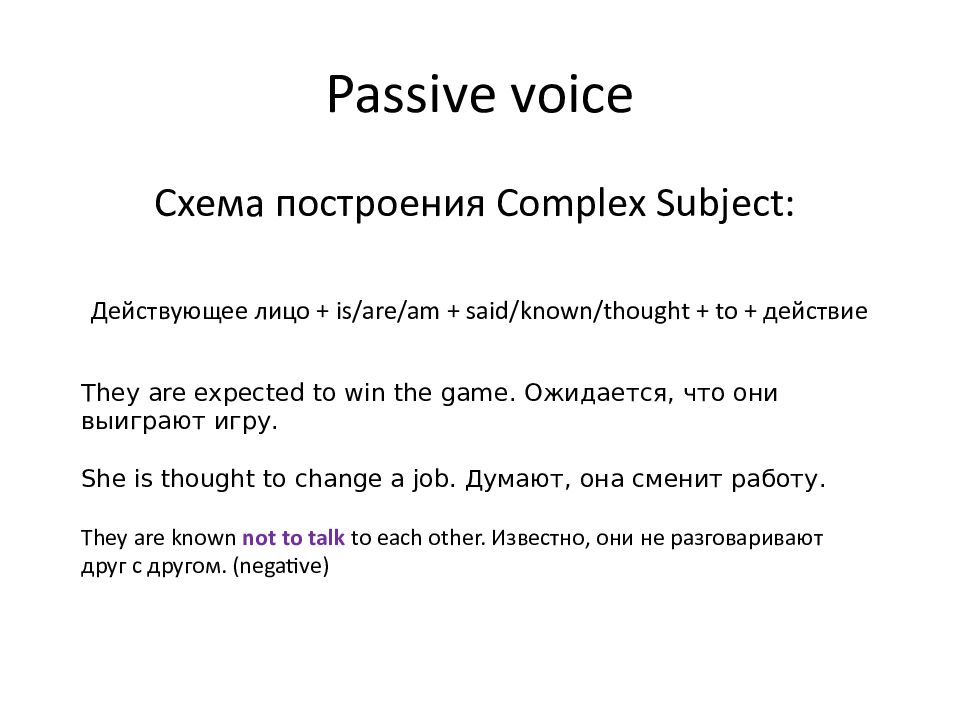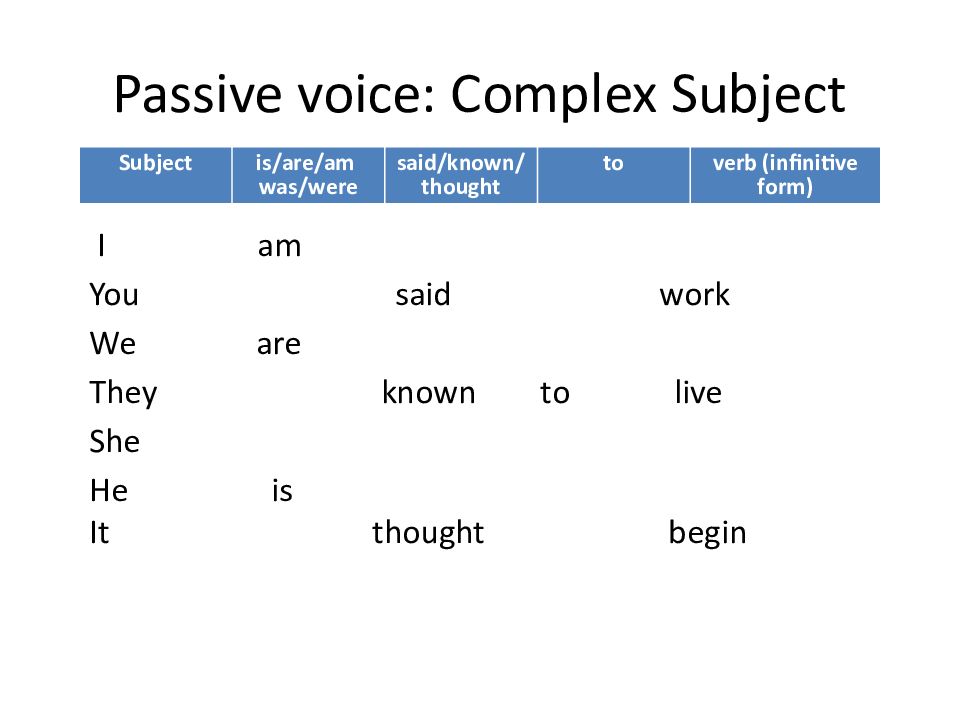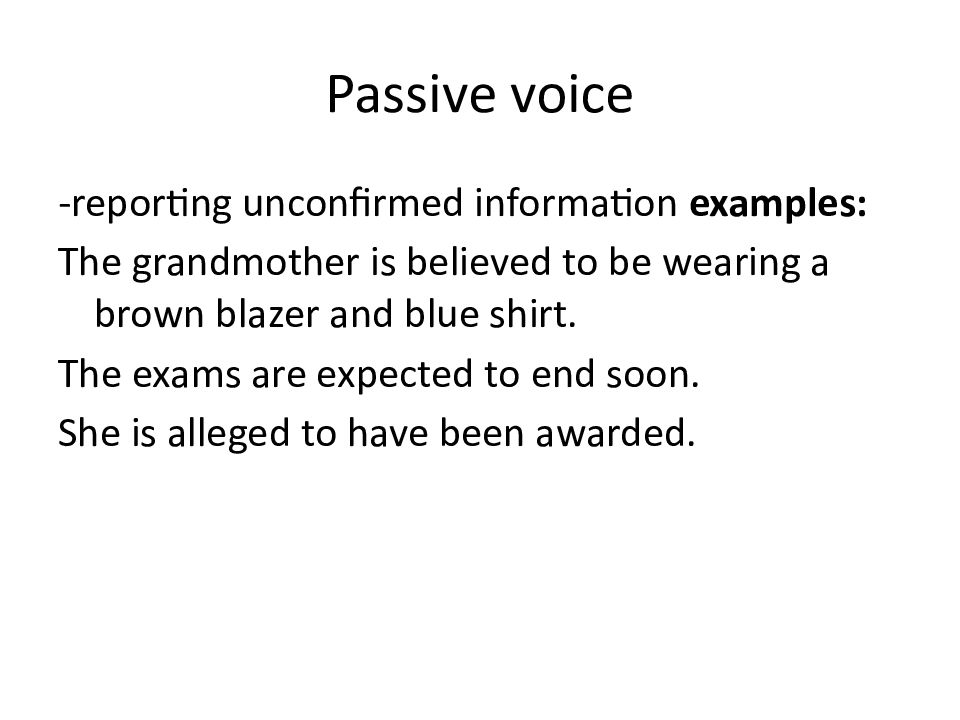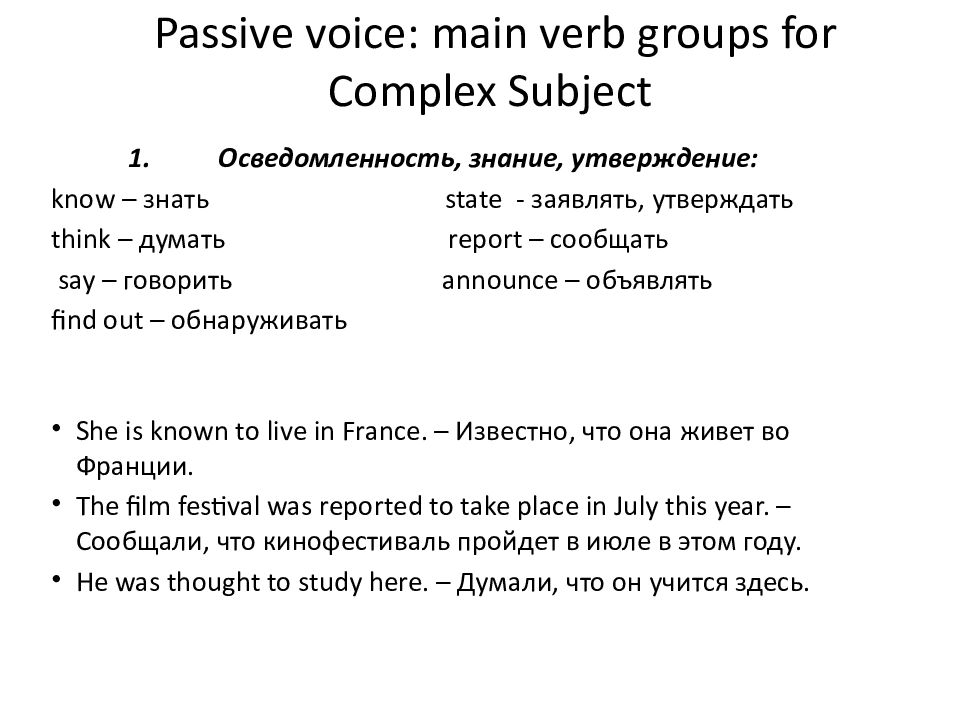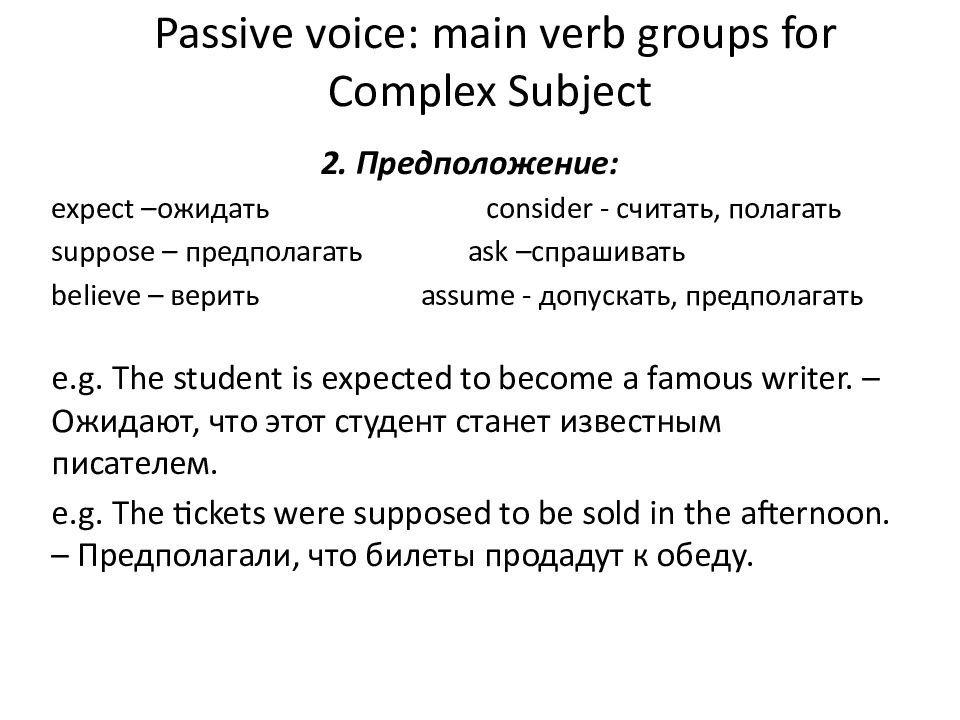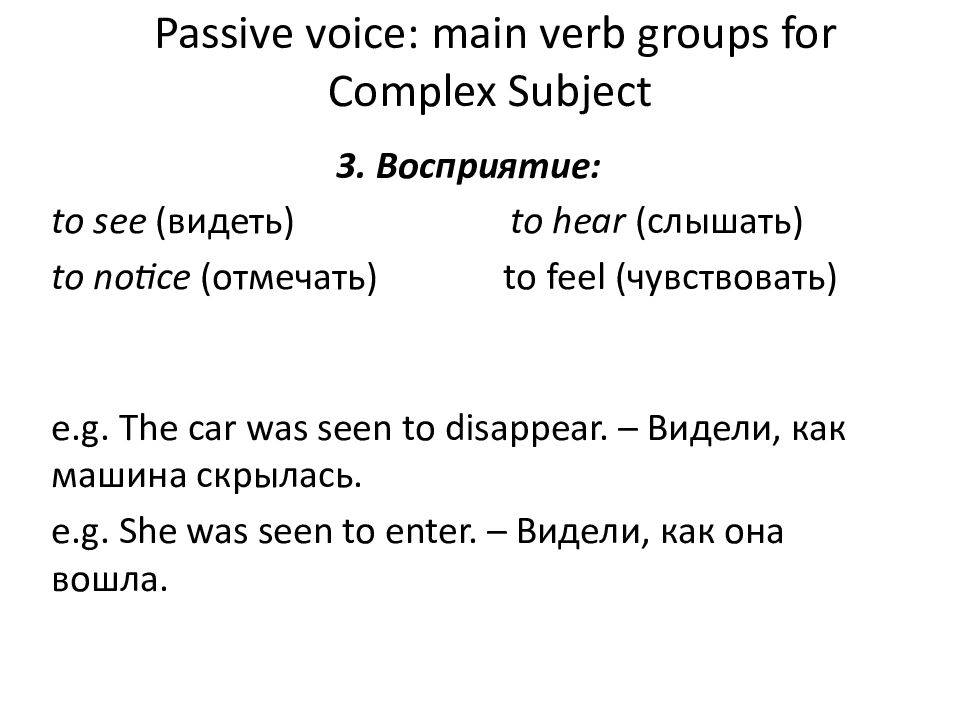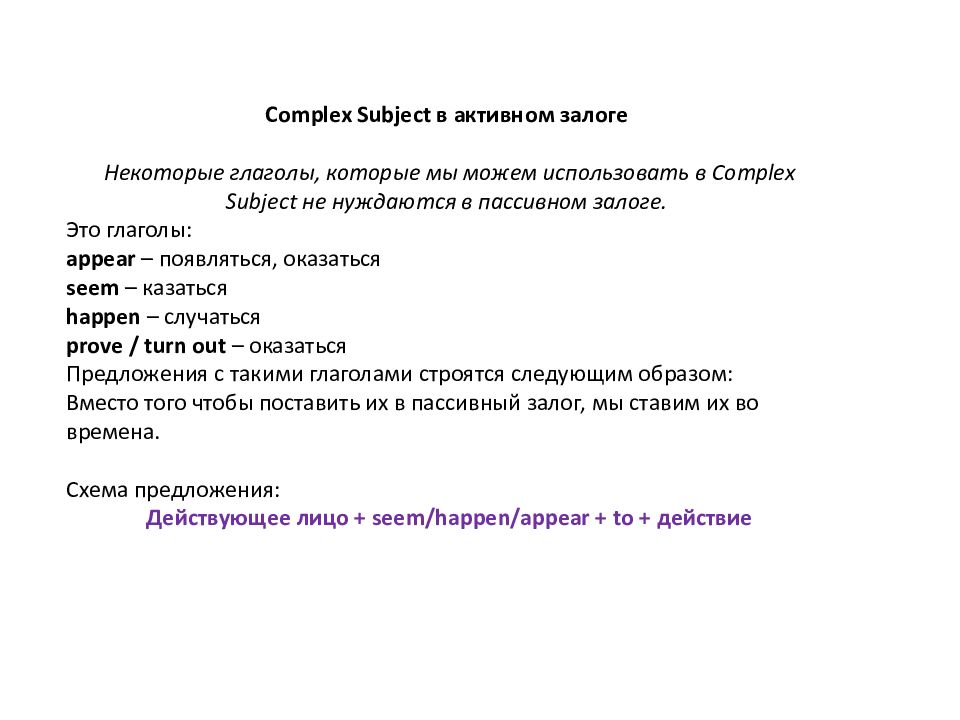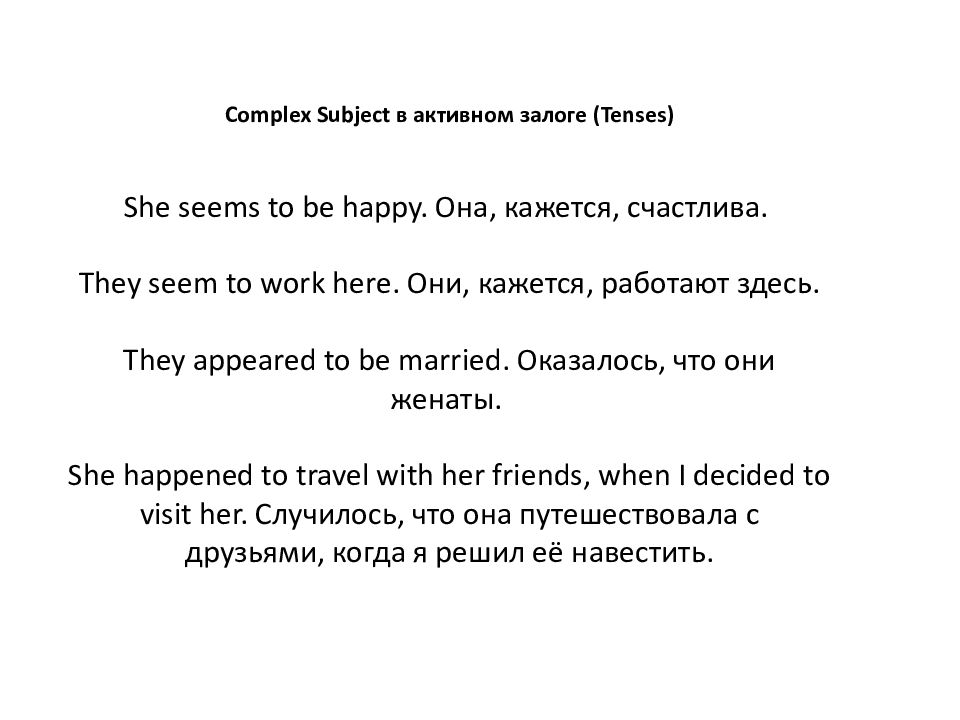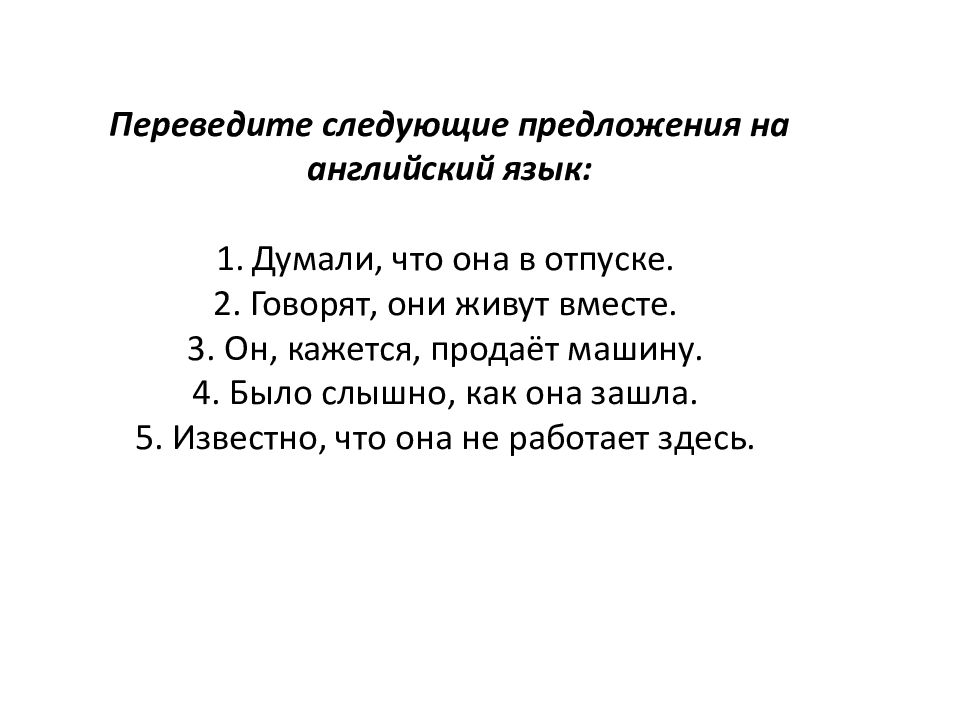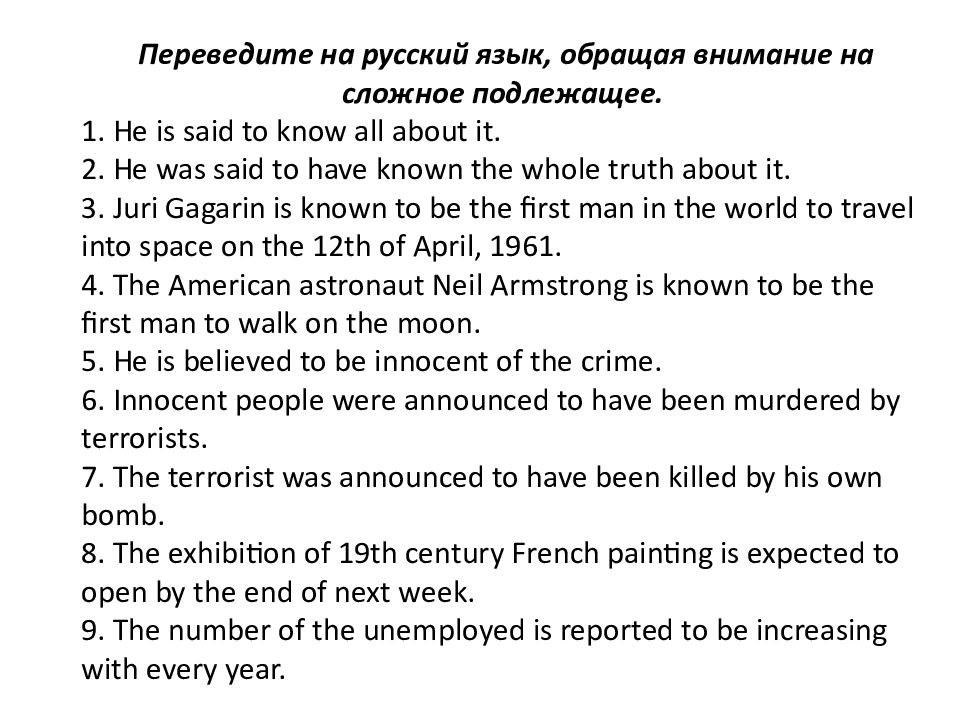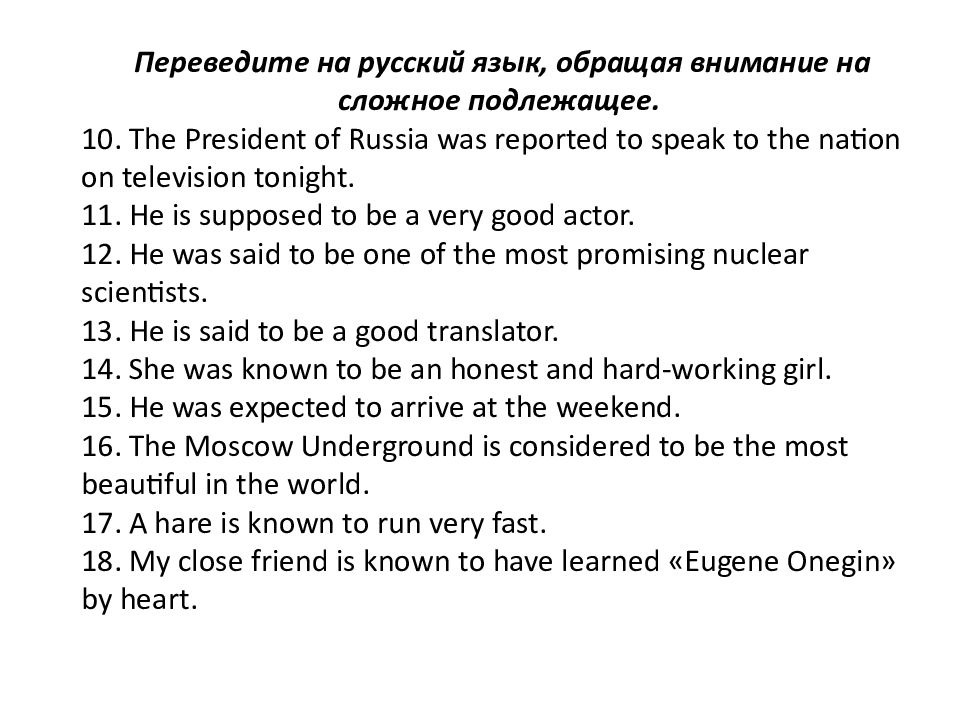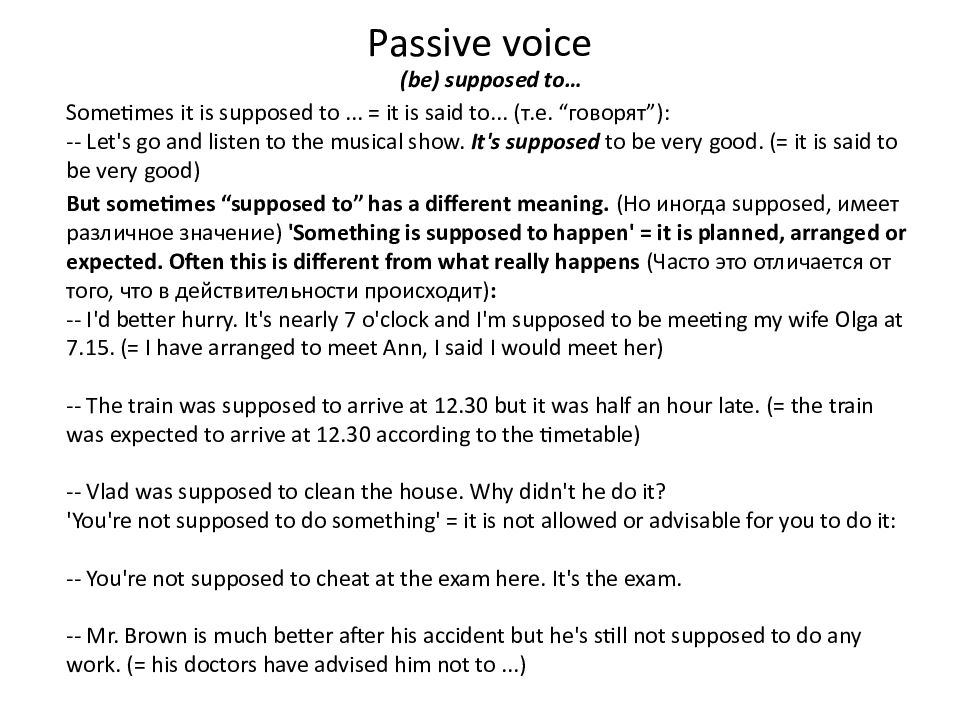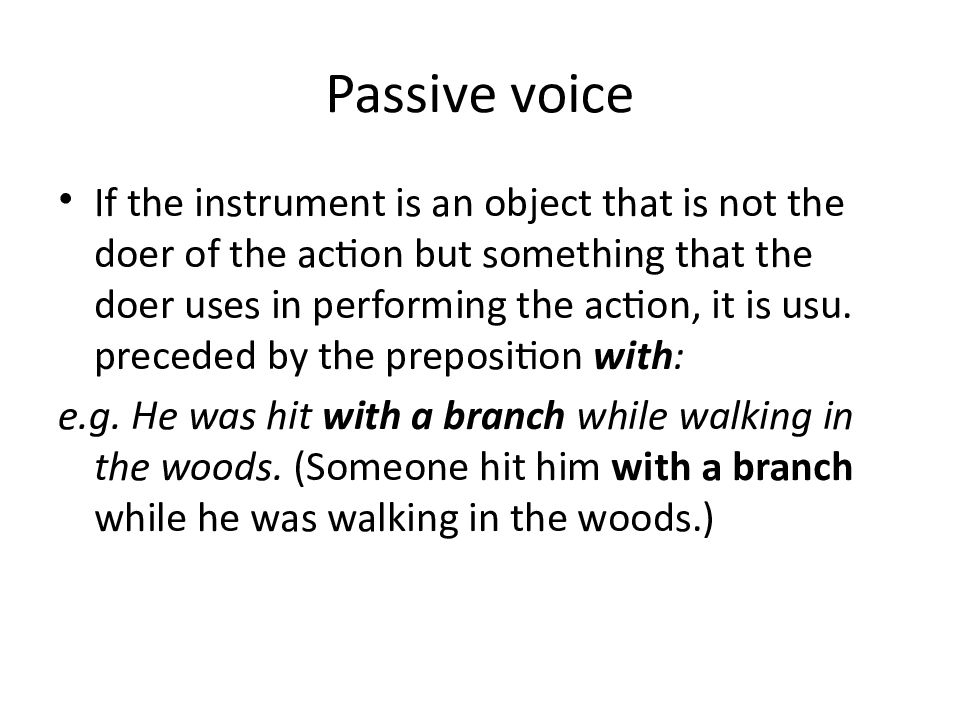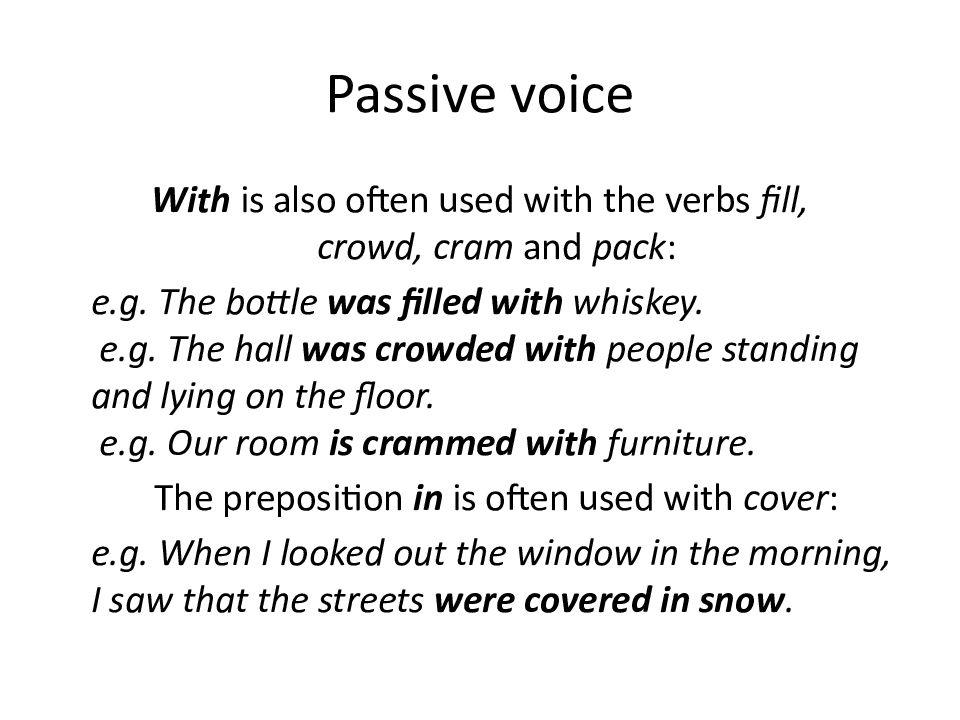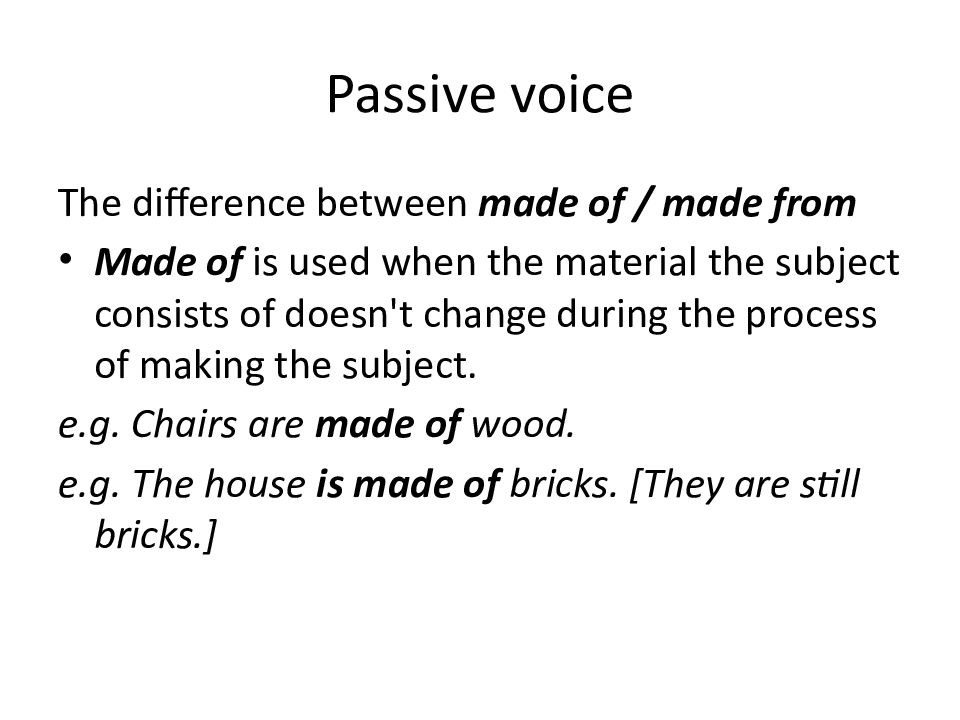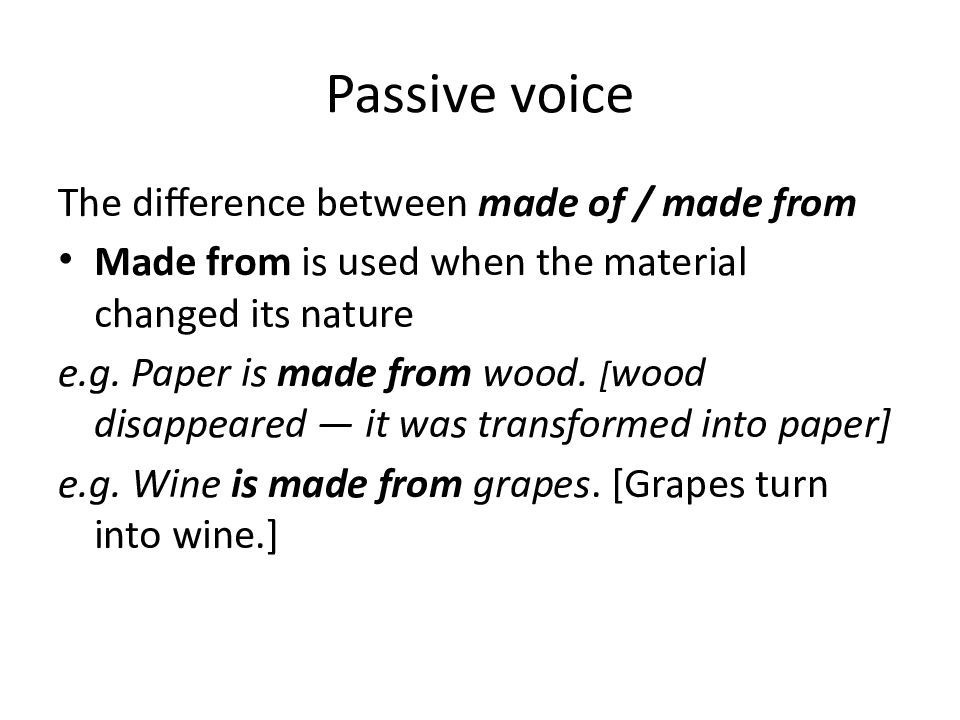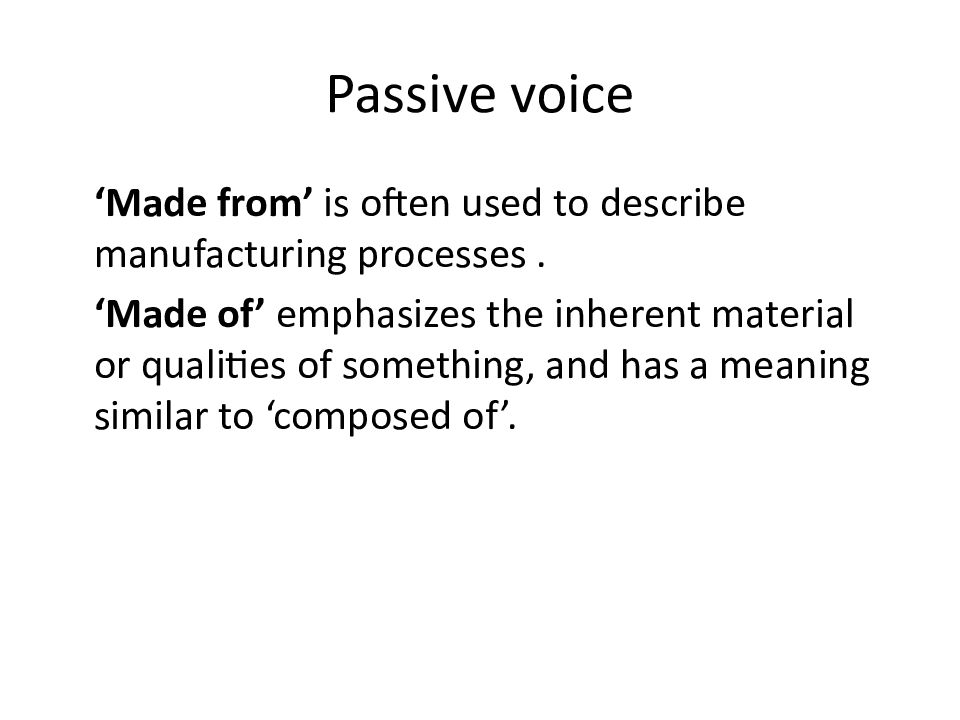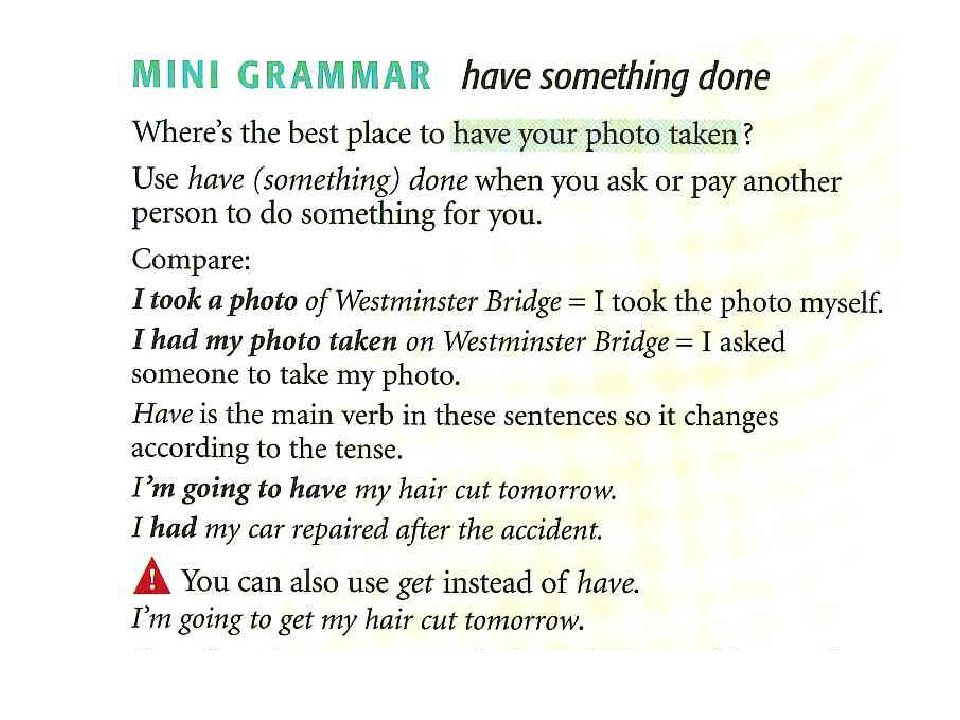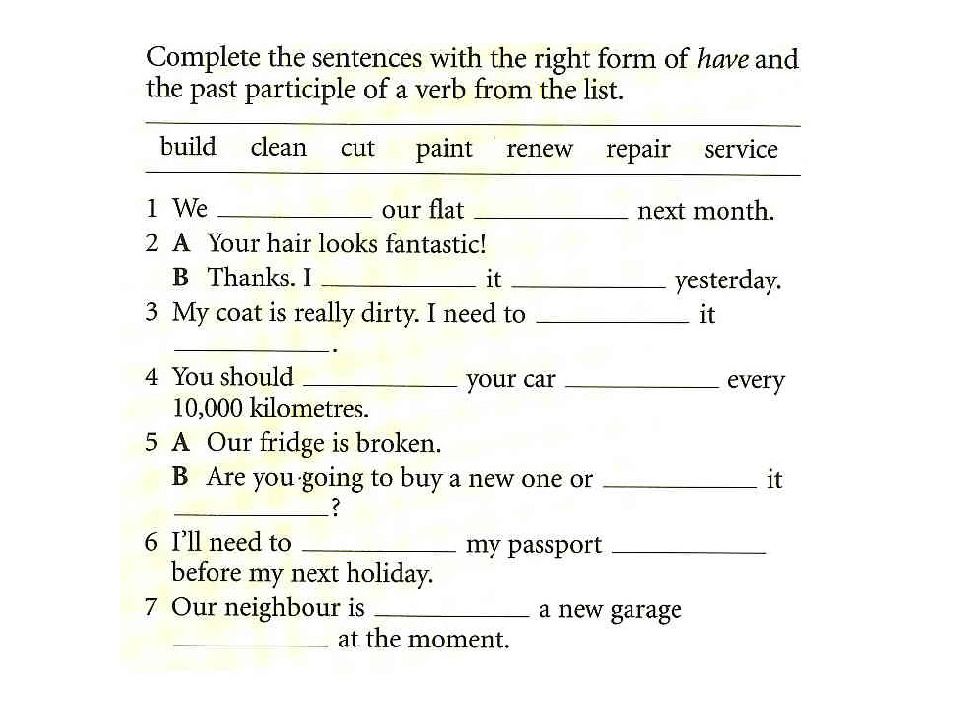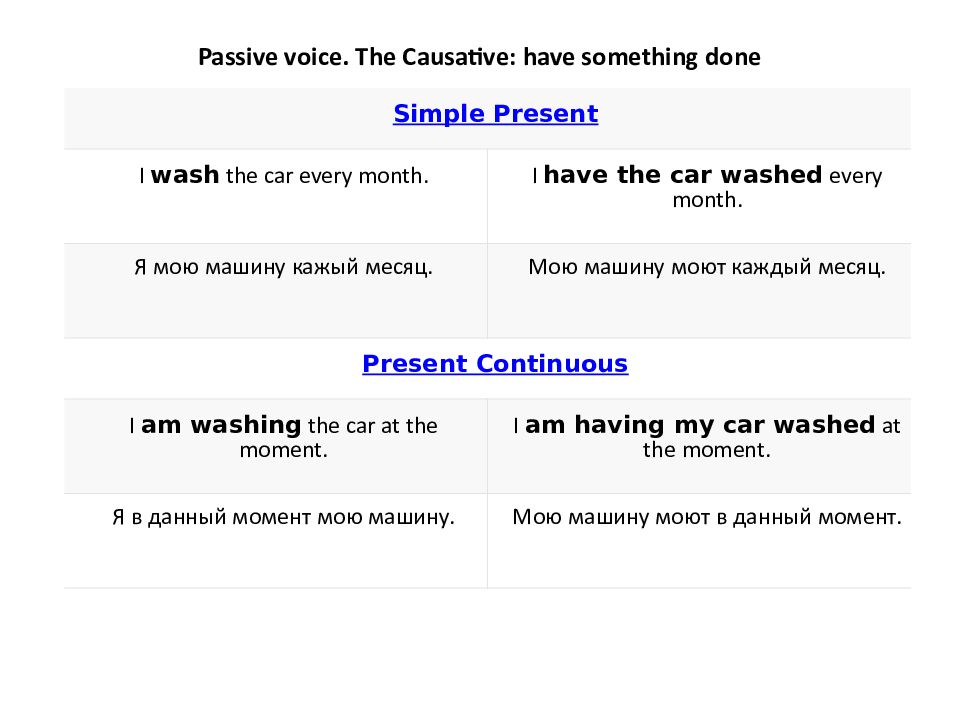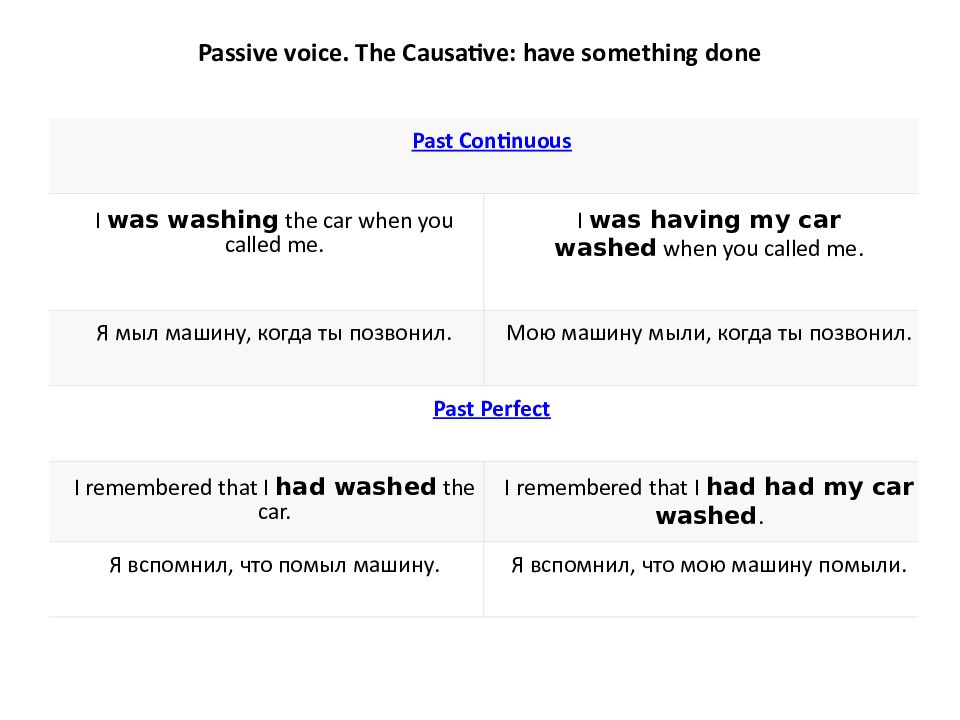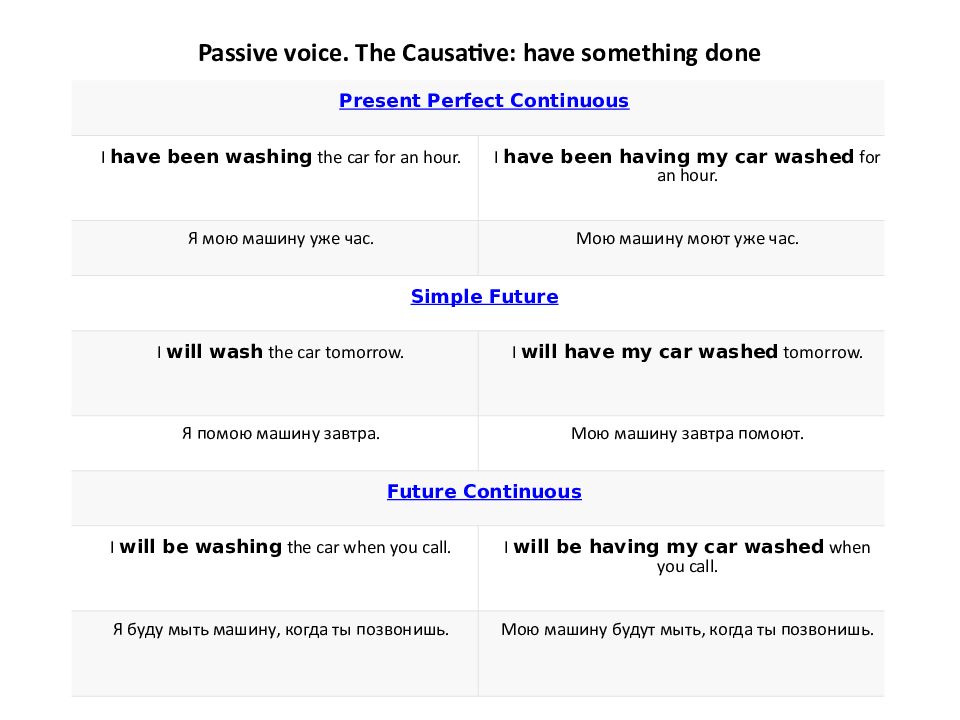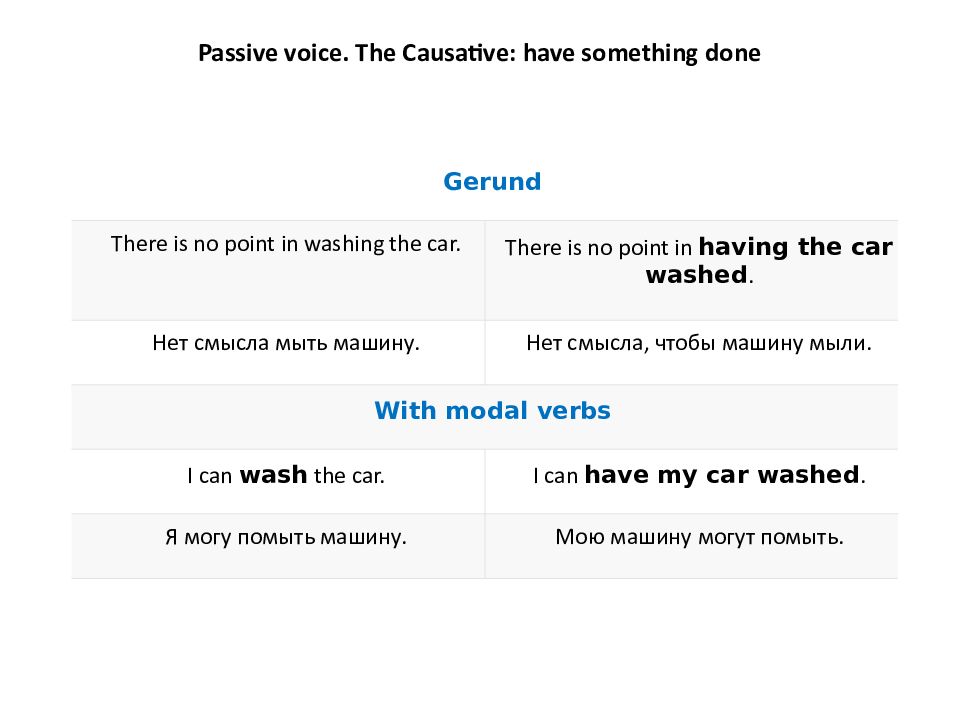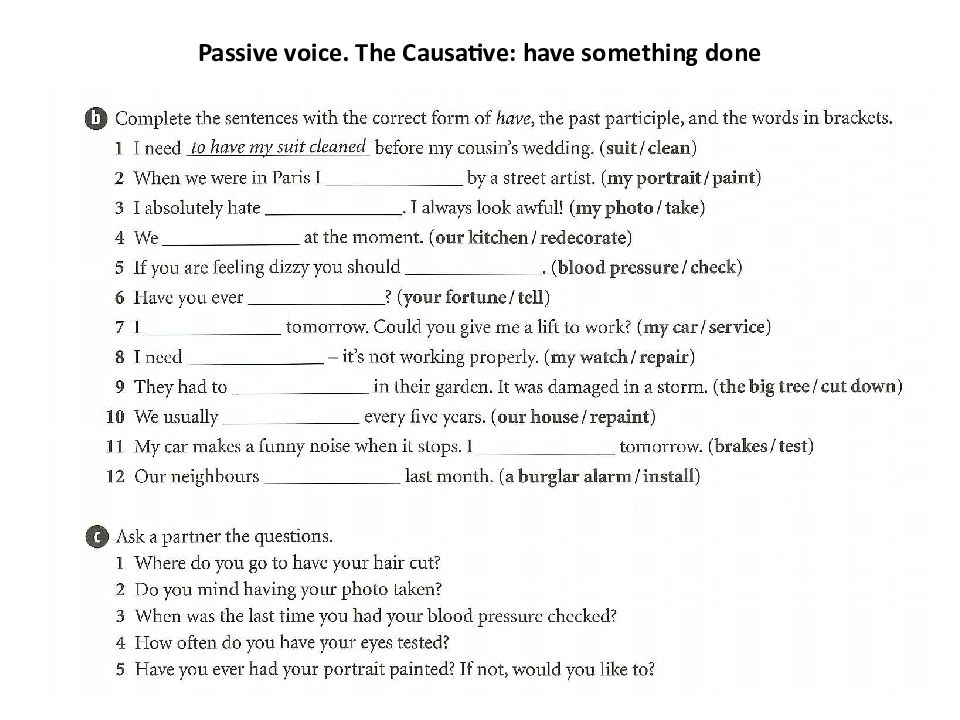Слайд 2: Passive voice
We use a Passive construction when we are not interested in who performs an action or it not necessary to know. e.g. He has been promoted to the post of Sales Director.
Слайд 3: Passive voice
PV is used To describe a process or procedure when writing in a formal style (reports, minutes of meetings, etc.) e.g. It was agreed to increase the share capital. Or It + passive + that-clause e.g. It was agreed that the share capital should be increased.
Слайд 5: Passive voice : Complex Subject
В предложениях с Complex Subject могут использоваться различные формы инфинитива – все зависит от необходимости продемонстрировать временные рамки или обозначить отношение одного отрезка времени к другому. His sister is told to be really charming. - Говорят, его сестра очаровательна. ( Simple Infinitive). Their team is announced to be competing at the moment. – Объявили, что их команда уже сейчас участвует в состязании. ( Continous Infinitive). Simon is said to have taken those books. – Говорят, что эти книги взял Саймон. ( Perfect Infinitive). She is supposed to have been training a lot before the competition. – Предполагают, что она много тренировалась перед соревнованиями. ( Perfect Continuous Infinitive).
Слайд 6: Passive voice
-reporting unconfirmed information (common in newspaper reporting) Verbs: say, think, consider, believe followed by an infinitive. e.g. The board is thought to be in favour of a merger. e.g. He is considered to be the best chairman the company has ever had.
Слайд 7: Passive voice
Схема построения Complex Subject: Действующее лицо + is/are/am + said/known/thought + to + действие They are expected to win the game. Ожидается, что они выиграют игру. She is thought to change a job. Думают, она сменит работу. They are known not to talk to each other. Известно, они не разговаривают друг с другом. (negative)
Слайд 8: Passive voice : Complex Subject
I am You said work We are They known to live She He is It thought begin Subject is/are/am was/were said/known/thought to verb (infinitive form)
Слайд 9: Passive voice
-reporting unconfirmed information Verbs : alleged – утверждают believed – считается considered – полагают expected – ожидается known – как известно reported – сообщили thought – предполагается understood – ( это) понимается
Слайд 10: Passive voice
-reporting unconfirmed information examples: The grandmother is believed to be wearing a brown blazer and blue shirt. The exams are expected to end soon. She is alleged to have been awarded.
Слайд 11: Passive voice : main verb groups for Complex Subject
Осведомленность, знание, утверждение: know – знать state - заявлять, утверждать think – думать report – сообщать say – говорить announce – объявлять find out – обнаруживать She is known to live in France. – Известно, что она живет во Франции. The film festival was reported to take place in July this year. – Сообщали, что кинофестиваль пройдет в июле в этом году. He was thought to study here. – Думали, что он учится здесь.
Слайд 12: Passive voice : main verb groups for Complex Subject
2. Предположение : expect –ожидать consider - считать, полагать suppose – предполагать ask –спрашивать believe – верить assume - допускать, предполагать e.g. The student is expected to become a famous writer. – Ожидают, что этот студент станет известным писателем. e.g. The tickets were supposed to be sold in the afternoon. – Предполагали, что билеты продадут к обеду.
Слайд 13: Passive voice : main verb groups for Complex Subject
3. Восприятие: to see ( видеть) to hear ( слышать) to notice ( отмечать ) to feel ( чувствовать ) e.g. The car was seen to disappear. – Видели, как машина скрылась. e.g. She was seen to enter. – Видели, как она вошла.
Слайд 14
Complex Subject в активном залоге Некоторые глаголы, которые мы можем использовать в Complex Subject не нуждаются в пассивном залоге. Это глаголы: appear – появляться, оказаться seem – казаться happen – случаться prove / turn out – оказаться Предложения с такими глаголами строятся следующим образом: Вместо того чтобы поставить их в пассивный залог, мы ставим их во времена. Схема предложения: Действующее лицо + seem / happen / appear + to + действие
Слайд 15
Complex Subject в активном залоге (Tenses) She seems to be happy. Она, кажется, счастлива. They seem to work here. Они, кажется, работают здесь. They appeared to be married. Оказалось, что они женаты. She happened to travel with her friends, when I decided to visit her. Случилось, что она путешествовала с друзьями, когда я решил её навестить.
Слайд 16
Переведите следующие предложения на английский язык : Думали, что она в отпуске. 2. Говорят, они живут вместе. 3. Он, кажется, продаёт машину. 4. Было слышно, как она зашла. 5. Известно, что она не работает здесь.
Слайд 17
Переведите на русский язык, обращая внимание на сложное подлежащее. 1. Не is said to know all about it. 2. He was said to have known the whole truth about it. 3. Juri Gagarin is known to be the first man in the world to travel into space on the 12th of April, 1961. 4. The American astronaut Neil Armstrong is known to be the first man to walk on the moon. 5. He is believed to be innocent of the crime. 6. Innocent people were announced to have been murdered by terrorists. 7. The terrorist was announced to have been killed by his own bomb. 8. The exhibition of 19th century French painting is expected to open by the end of next week. 9. The number of the unemployed is reported to be increasing with every year.
Слайд 18
Переведите на русский язык, обращая внимание на сложное подлежащее. 10. The President of Russia was reported to speak to the nation on television tonight. 11. He is supposed to be a very good actor. 12. He was said to be one of the most promising nuclear scientists. 13. He is said to be a good translator. 14. She was known to be an honest and hard-working girl. 15. He was expected to arrive at the weekend. 16. The Moscow Underground is considered to be the most beautiful in the world. 17. A hare is known to run very fast. 18. My close friend is known to have learned «Eugene Onegin » by heart.
Слайд 19: Passive voice
( be ) supposed to … Sometimes it is supposed to... = it is said to... ( т.е. “говорят ” ) : -- Let's go and listen to the musical show. It's supposed to be very good. (= it is said to be very good) But sometimes “supposed to” has a different meaning. ( Но иногда supposed, имеет различное значение ) 'Something is supposed to happen' = it is planned, arranged or expected. Often this is different from what really happens ( Часто это отличается от того, что в действительности происходит ) : -- I'd better hurry. It's nearly 7 o'clock and I'm supposed to be meeting my wife Olga at 7.15. (= I have arranged to meet Ann, I said I would meet her) -- The train was supposed to arrive at 12.30 but it was half an hour late. (= the train was expected to arrive at 12.30 according to the timetable) -- Vlad was supposed to clean the house. Why didn't he do it? 'You're not supposed to do something' = it is not allowed or advisable for you to do it: -- You're not supposed to cheat at the exam here. It's the exam. -- Mr. Brown is much better after his accident but he's still not supposed to do any work. (= his doctors have advised him not to...)
Слайд 20: Passive voice
In most passive sentences, the agent is not mentioned. If it is mentioned, however, it is usually preceded by the preposition by : e.g. He was hit by a falling branch while walking in the woods. ( A falling branch hit him while he was walking in the woods.)
Слайд 21: Passive voice
If the instrument is an object that is not the doer of the action but something that the doer uses in performing the action, it is usu. preceded by the preposition with : e.g. He was hit with a branch while walking in the woods. (Someone hit him with a branch while he was walking in the woods.)
Слайд 22: Passive voice
With is also often used with the verbs fill, crowd, cram and pack : e.g. The bottle was filled with whiskey. e.g. The hall was crowded with people standing and lying on the floor. e.g. Our room is crammed with furniture. The preposition in is often used with cover : e.g. When I looked out the window in the morning, I saw that the streets were covered in snow.
Слайд 23: Passive voice
The difference between made of / made from Made of is used when the material the subject consists of doesn't change during the process of making the subject. e.g. Chairs are made of wood. e.g. The house is made of bricks. [They are still bricks.]
Слайд 24: Passive voice
The difference between made of / made from Made from is used when the material changed its nature e.g. Paper is made from wood. [ wood disappeared — it was transformed into paper] e.g. Wine is made from grapes. [Grapes turn into wine.]
Слайд 25: Passive voice
‘Made from’ is often used to describe manufacturing processes. ‘Made of’ emphasizes the inherent material or qualities of something, and has a meaning similar to ‘composed of’.
Слайд 26: Passive voice
‘Made from’ is often used to describe manufacturing processes. ‘Made of’ emphasizes the inherent material or qualities of something, and has a meaning similar to ‘composed of’.
Слайд 28: Passive voice. The Causative: have something done
Simple Present I wash the car every month. I have the car washed every month. Я мою машину кажый месяц. Мою машину моют каждый месяц. Present Continuous I am washing the car at the moment. I am having my car washed at the moment. Я в данный момент мою машину. Мою машину моют в данный момент.
Слайд 29: Passive voice. The Causative: have something done
Present Perfect I have already washed the car. I have already had my car washed. Я уже помыл машину. Мою машину уже помыли. Simple Past I washed the car yesterday. I had my car washed yesterday. Я помыл машину вчера. Мою машину помыли вчера.
Слайд 30: Passive voice. The Causative: have something done
Past Continuous I was washing the car when you called me. I was having my car washed when you called me. Я мыл машину, когда ты позвонил. Мою машину мыли, когда ты позвонил. Past Perfect I remembered that I had washed the car. I remembered that I had had my car washed. Я вспомнил, что помыл машину. Я вспомнил, что мою машину помыли.
Слайд 31: Passive voice. The Causative: have something done
Present Perfect Continuous I have been washing the car for an hour. I have been having my car washed for an hour. Я мою машину уже час. Мою машину моют уже час. Simple Future I will wash the car tomorrow. I will have my car washed tomorrow. Я помою машину завтра. Мою машину завтра помоют. Future Continuous I will be washing the car when you call. I will be having my car washed when you call. Я буду мыть машину, когда ты позвонишь. Мою машину будут мыть, когда ты позвонишь.
Слайд 32: Passive voice. The Causative: have something done
Gerund There is no point in washing the car. There is no point in having the car washed. Нет смысла мыть машину. Нет смысла, чтобы машину мыли. With modal verbs I can wash the car. I can have my car washed. Я могу помыть машину. Мою машину могут помыть.
